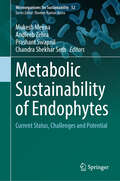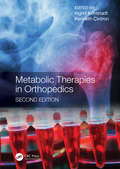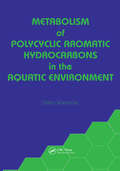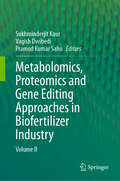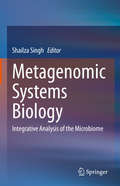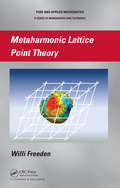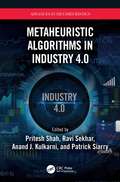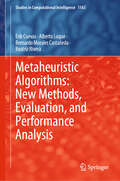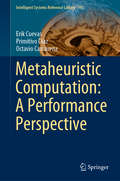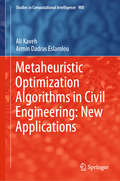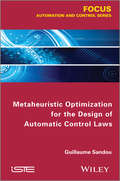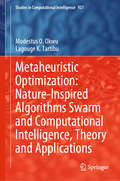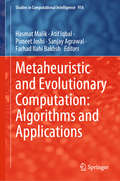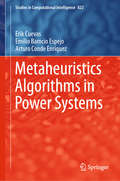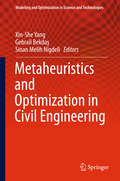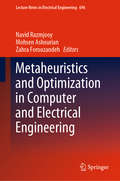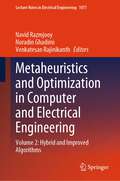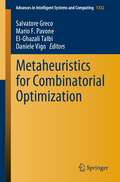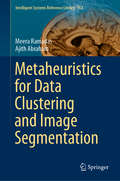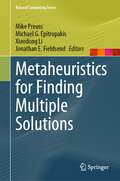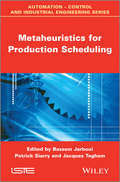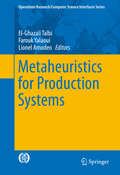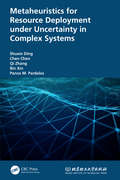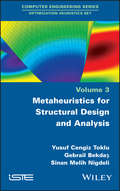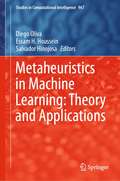- Table View
- List View
Metabolic Sustainability of Endophytes: Current Status, Challenges and Potential (Microorganisms for Sustainability #52)
by Chandra Shekhar Seth Mukesh Meena Andleeb Zehra Prashant SwapnilThis book describes the diversity and functional roles of fungal endophytes. It explains their beneficial impacts along with the practical applications in crop production. The endophytes are an important possibility for research on future medications and biopesticides in view of the production of secondary metabolites. In the context of agriculture, the book chapters delve into the biostimulant properties of endophytic fungi, offering sustainable solutions for crop production. This extends to their relationships with medicinal plants, paving the way for potential breakthroughs in medicine and agriculture alike. The book encompasses the adaptability and potential of endophytic fungi, emphasizing their future role as biostimulants for the viable bioprospecting of high-value secondary metabolites. Molecular mechanisms governing future host-endophyte interactions is discussed to provide a deeper understanding of signaling pathways. This book is an important asset for future students, researchers in plant science, and professionals across diverse industries, fostering a nuanced comprehension of fungal endophytes and their multifaceted roles in the pursuit of future metabolic sustainability.
Metabolic Therapies in Orthopedics, Second Edition
by Ingrid Kohlstadt Kenneth CintronThe first medical reference textbook to compile an unprecedented synthesis of evidence for regenerative orthopedics by key opinion leaders Thirty-five authors address your clinical questions What emerging technologies are right for my clinical practice? How can I strengthen my patients before their orthopedic surgery? Practically speaking, how can I leverage the latest metabolic therapies to safeguard my patients from toxins, medications, food and chronic diseases known to adversely affect the musculoskeletal system? "Ask the Author" feature Would you like to discuss a patient with a particular author? Now you can do so at www.betterorthopedics.com. First to be second Did you notice this book is the first book in regenerative orthopedics to publish a second edition? This diverse author team leads the growing field of regenerative orthopedics and offers the broadest and in-depth approach to leveraging metabolic therapies. This book comprises the professional opinion of its authors. It does not claim to represent guidelines, recommendations, or the current standard of medical care.
Metabolism of Polycyclic Aromatic Hydrocarbons in the Aquatic Environment
by Usha VaranasiThis book shows how the biological transport, bioaccumulation, disposition, and toxicity of polycyclic aromatic hydrocarbons (PAH) in the aquatic environment are influenced by the ability or inability of organisms to metabolize these environmental pollutants. Written by leading scientists in the fields of PAH metabolism and toxicity in both aquatic and mammalian systems, this book discusses recent advances in the areas of PAH biogeochemistry and bioaccumulation, microbial degradation, enzymes of activation, and detoxication, metabolism of PAH, and laboratory and field studies on carcinogenic/toxic effects. Additionally, important similarities and differences in metabolism of PAH by aquatic and terrestrial organisms are featured. The discussion of bioavailability, metabolism, and subsequent toxic effects should aid in the assessment of the ecological consequences of PAH in the aquatic environment.
Metabolomics, Proteomics and Gene Editing Approaches in Biofertilizer Industry: Volume II
by Pramod Kumar Sahu Vagish Dwibedi Sukhminderjit KaurBiofertilizer refers to the live or latent microbial inoculants capable of enhancing plant growth through direct and indirect mechanisms. This book covers strategies for harnessing the integrated technologies, omics, proteomics, and metabolomics for the development of potential novel biofertilizers. Modern techniques for enhancing the efficacy and quality of biofertilizers has been discussed in detail. Increasing crop productivity poses a great challenge due to increasing global population and researchers are looking for solutions to this using sustainable approaches. Biofertilizers play an imperative role in enhancing yield production in crops and this book covers detailed account of biofertilizers on a single platform. It also provides guidance on sustainable ways of increasing crop production and helps in generating ideas to formulate collaboration between public and private sectors for future innovation in the field of biofertilizers.This book is especially designed for the research graduates, young researchers and scholars who are directly involved in the research-related activities of the biofertilizers. It can also be useful to professors, lecturers, biotechnologists, biofertilizer production specialists and other stakeholders associated with strain improvement for biofertilizer development.
Metagenomic Systems Biology: Integrative Analysis of the Microbiome
by Shailza SinghThe book serves as an amalgamation of knowledge and principles used in the area of systems and synthetic biology, and targets inter-disciplinary research groups. The readers from diversified areas would be benefited by the valuable resources and information available in one book. Microbiome projects with efficient data handling can fuel progress in the area of microbial synthetic biology by providing a ready to use plug and play chassis. Advances in gene editing technology such as the use of tailor made synthetic transcription factors will further enhance the availability of synthetic devices to be applied in the fields of environment, agriculture and health. The different chapters of the book reviews a broad range of topics, including food microbiome in ecology, use of microbiome in personalized medicine, machine learning in biomedicine. The book also describes ways to harness and exploit the incredible amounts of genomic data. The book is not only limited to medicine but also caters to the needs of environmentalists, biochemical engineers etc. It will be of interest to advanced students and researchers in life sciences, computational biology, microbiology and other inter-disciplinary areas.
Metaharmonic Lattice Point Theory (Chapman & Hall Pure and Applied Mathematics)
by Willi FreedenMetaharmonic Lattice Point Theory covers interrelated methods and tools of spherically oriented geomathematics and periodically reflected analytic number theory. The book establishes multi-dimensional Euler and Poisson summation formulas corresponding to elliptic operators for the adaptive determination and calculation of formulas and identities of
Metaheuristic Algorithms in Industry 4.0 (Advances in Metaheuristics)
by Patrick Siarry Anand J. Kulkarni Pritesh Shah Ravi SekharDue to increasing industry 4.0 practices, massive industrial process data is now available for researchers for modelling and optimization. Artificial Intelligence methods can be applied to the ever-increasing process data to achieve robust control against foreseen and unforeseen system fluctuations. Smart computing techniques, machine learning, deep learning, computer vision, for example, will be inseparable from the highly automated factories of tomorrow. Effective cybersecurity will be a must for all Internet of Things (IoT) enabled work and office spaces. This book addresses metaheuristics in all aspects of Industry 4.0. It covers metaheuristic applications in IoT, cyber physical systems, control systems, smart computing, artificial intelligence, sensor networks, robotics, cybersecurity, smart factory, predictive analytics and more. Key features: Includes industrial case studies. Includes chapters on cyber physical systems, machine learning, deep learning, cybersecurity, robotics, smart manufacturing and predictive analytics. surveys current trends and challenges in metaheuristics and industry 4.0. Metaheuristic Algorithms in Industry 4.0 provides a guiding light to engineers, researchers, students, faculty and other professionals engaged in exploring and implementing industry 4.0 solutions in various systems and processes.
Metaheuristic Algorithms: New Methods, Evaluation, and Performance Analysis (Studies in Computational Intelligence #1163)
by Erik Cuevas Alberto Luque Bernardo Morales Castañeda Beatriz RiveraThis book encompasses three distinct yet interconnected objectives. Firstly, it aims to present and elucidate novel metaheuristic algorithms that feature innovative search mechanisms, setting them apart from conventional metaheuristic methods. Secondly, this book endeavors to systematically assess the performance of well-established algorithms across a spectrum of intricate and real-world problems. Finally, this book serves as a vital resource for the analysis and evaluation of metaheuristic algorithms. It provides a foundational framework for assessing their performance, particularly in terms of the balance between exploration and exploitation, as well as their capacity to obtain optimal solutions. Collectively, these objectives contribute to advancing our understanding of metaheuristic methods and their applicability in addressing diverse and demanding optimization tasks. The materials were compiled from a teaching perspective. For this reason, the book is primarily intended for undergraduate and postgraduate students of Science, Electrical Engineering, or Computational Mathematics. Additionally, engineering practitioners who are not familiar with metaheuristic computation concepts will appreciate that the techniques discussed are beyond simple theoretical tools because they have been adapted to solve significant problems that commonly arise in engineering areas.
Metaheuristic Computation: A Performance Perspective (Intelligent Systems Reference Library #195)
by Erik Cuevas Primitivo Diaz Octavio CamarenaThis book is primarily intended for undergraduate and postgraduate students of Science, Electrical Engineering, or Computational Mathematics. Metaheuristic search methods are so numerous and varied in terms of design and potential applications; however, for such an abundant family of optimization techniques, there seems to be a question which needs to be answered: Which part of the design in a metaheuristic algorithm contributes more to its better performance? Several works that compare the performance among metaheuristic approaches have been reported in the literature. Nevertheless, they suffer from one of the following limitations: (A)Their conclusions are based on the performance of popular evolutionary approaches over a set of synthetic functions with exact solutions and well-known behaviors, without considering the application context or including recent developments. (B) Their conclusions consider only the comparison of their final results which cannot evaluate the nature of a good or bad balance between exploration and exploitation. The objective of this book is to compare the performance of various metaheuristic techniques when they are faced with complex optimization problems extracted from different engineering domains. The material has been compiled from a teaching perspective.
Metaheuristic Optimization Algorithms in Civil Engineering: New Applications (Studies in Computational Intelligence #900)
by Ali Kaveh Armin Dadras EslamlouThis book discusses the application of metaheuristic algorithms in a number of important optimization problems in civil engineering. Advances in civil engineering technologies require greater accuracy, efficiency and speed in terms of the analysis and design of the corresponding systems. As such, it is not surprising that novel methods have been developed for the optimal design of real-world systems and models with complex configurations and large numbers of elements. This book is intended for scientists, engineers and students wishing to explore the potential of newly developed metaheuristics in practical problems. It presents concepts that are not only applicable to civil engineering problems, but can also used for optimizing problems related to mechanical, electrical, and industrial engineering. It is an essential resource for civil, mechanical and electrical engineers who use optimization methods for design, as well as for students and researchers interested in structural optimization.
Metaheuristic Optimization for the Design of Automatic Control Laws
by Guillaume SandouThe classic approach in Automatic Control relies on the use of simplified models of the systems and reformulations of the specifications. In this framework, the control law can be computed using deterministic algorithms. However, this approach fails when the system is too complex for its model to be sufficiently simplified, when the designer has many constraints to take into account, or when the goal is not only to design a control but also to optimize it. This book presents a new trend in Automatic Control with the use of metaheuristic algorithms. These kinds of algorithm can optimize any criterion and constraint, and therefore do not need such simplifications and reformulations. The first chapter outlines the author’s main motivations for the approach which he proposes, and presents the advantages which it offers. In Chapter 2, he deals with the problem of system identification. The third and fourth chapters are the core of the book where the design and optimization of control law, using the metaheuristic method (particle swarm optimization), is given. The proposed approach is presented along with real-life experiments, proving the efficiency of the methodology. Finally, in Chapter 5, the author proposes solving the problem of predictive control of hybrid systems. Contents 1. Introduction and Motivations. 2. Symbolic Regression. 3. PID Design Using Particle Swarm Optimization. 4. Tuning and Optimization of H-infinity Control Laws. 5. Predictive Control of Hybrid Systems. About the Authors Guillaume Sandou is Professor in the Automatic Department of Supélec, in Gif Sur Yvette, France. He has had 12 books, 8 journal papers and 1 patent published, and has written papers for 32 international conferences.His main research interests include modeling, optimization and control of industrial systems; optimization and metaheuristics for Automatic Control; and constrained control.
Metaheuristic Optimization: Nature-Inspired Algorithms Swarm and Computational Intelligence, Theory and Applications (Studies in Computational Intelligence #927)
by Modestus O. Okwu Lagouge K. TartibuThis book exemplifies how algorithms are developed by mimicking nature. Classical techniques for solving day-to-day problems is time-consuming and cannot address complex problems. Metaheuristic algorithms are nature-inspired optimization techniques for solving real-life complex problems. This book emphasizes the social behaviour of insects, animals and other natural entities, in terms of converging power and benefits. Major nature-inspired algorithms discussed in this book include the bee colony algorithm, ant colony algorithm, grey wolf optimization algorithm, whale optimization algorithm, firefly algorithm, bat algorithm, ant lion optimization algorithm, grasshopper optimization algorithm, butterfly optimization algorithm and others. The algorithms have been arranged in chapters to help readers gain better insight into nature-inspired systems and swarm intelligence. All the MATLAB codes have been provided in the appendices of the book to enable readers practice how to solve examples included in all sections. This book is for experts in Engineering and Applied Sciences, Natural and Formal Sciences, Economics, Humanities and Social Sciences.
Metaheuristic and Evolutionary Computation: Algorithms and Applications (Studies in Computational Intelligence #916)
by Atif Iqbal Sanjay Agrawal Hasmat Malik Puneet Joshi Farhad Ilahi BakhshThis book addresses the principles and applications of metaheuristic approaches in engineering and related fields. The first part covers metaheuristics tools and techniques such as ant colony optimization and Tabu search, and their applications to several classes of optimization problems. In turn, the book’s second part focuses on a wide variety of metaheuristics applications in engineering and/or the applied sciences, e.g. in smart grids and renewable energy. In addition, the simulation codes for the problems discussed are included in an appendix for ready reference.Intended for researchers aspiring to learn and apply metaheuristic techniques, and gathering contributions by prominent experts in the field, the book offers readers an essential introduction to metaheuristics, its theoretical aspects and applications.
Metaheuristics Algorithms in Power Systems (Studies in Computational Intelligence #822)
by Erik Cuevas Emilio Barocio Espejo Arturo Conde EnríquezThis book discusses the use of efficient metaheuristic algorithms to solve diverse power system problems, providing an overview of the various aspects of metaheuristic methods to enable readers to gain a comprehensive understanding of the field and of conducting studies on specific metaheuristic algorithms related to power-system applications. By bridging the gap between recent metaheuristic techniques and novel power system methods that benefit from the convenience of metaheuristic methods, it offers power system practitioners who are not metaheuristic computation researchers insights into the techniques, which go beyond simple theoretical tools and have been adapted to solve important problems that commonly arise. On the other hand, members of the metaheuristic computation community learn how power engineering problems can be translated into optimization tasks, and it is also of interest to engineers and application developers. Further, since each chapter can be read independently, the relevant information can be quickly found. Power systems is a multidisciplinary field that addresses the multiple approaches used for design and analysis in areas ranging from signal processing, and electronics to computational intelligence, including the current trend of metaheuristic computation.
Metaheuristics and Optimization in Civil Engineering
by Xin-She Yang Gebrail Bekdaş Sinan Melih NigdeliThis timely book deals with a current topic, i. e. the applications of metaheuristic algorithms, with a primary focus on optimization problems in civil engineering. The first chapter offers a concise overview of different kinds of metaheuristic algorithms, explaining their advantages in solving complex engineering problems that cannot be effectively tackled by traditional methods, and citing the most important works for further reading. The remaining chapters report on advanced studies on the applications of certain metaheuristic algorithms to specific engineering problems. Genetic algorithm, bat algorithm, cuckoo search, harmony search and simulated annealing are just some of the methods presented and discussed step by step in real-application contexts, in which they are often used in combination with each other. Thanks to its synthetic yet meticulous and practice-oriented approach, the book is a perfect guide for graduate students, researchers and professionals willing to applying metaheuristic algorithms in civil engineering and other related engineering fields, such as mechanical, transport and geotechnical engineering. It is also a valuable aid for both lectures and advanced engineering students.
Metaheuristics and Optimization in Computer and Electrical Engineering (Lecture Notes in Electrical Engineering #696)
by Navid Razmjooy Mohsen Ashourian Zahra ForoozandehThe use of artificial intelligence, especially in the field of optimization is increasing day by day. The purpose of this book is to explore the possibility of using different kinds of optimization algorithms to advance and enhance the tools used for computer and electrical engineering purposes.
Metaheuristics and Optimization in Computer and Electrical Engineering: Volume 2: Hybrid and Improved Algorithms (Lecture Notes in Electrical Engineering #1077)
by Noradin Ghadimi Venkatesan Rajinikanth Navid RazmjooyThis book discusses different methods of modifying the original metaheuristics and their application in computer and electrical engineering. As the race to develop advanced technology accelerates, a new era of "metaheuristics" has emerged. Through researched-based techniques and collaborative problem-solving, this book helps engineers to find efficient solutions to their engineering challenges. With the help of an expert guide and the collective knowledge of the engineering community, this comprehensive guide shows readers how to use machine learning and other AI techniques to reinvent smart engineering. From understanding the fundamentals to mastering the latest metaheuristics models, this guide provides with the skills and knowledge that need to stay ahead in the technology race. In the previous volume, authors focused on the application of original metaheuristics on electrical and computer sciences. This volume learns how AI and modified metaheuristics can be used to optimize algorithms and create more efficient electrical engineering designs. It gets insights on how data can be effectively processed and discover new techniques for creating sophisticated automation systems. It maximizes the potential of readers’ computer and electrical engineering projects with powerful metaheuristics and optimization techniques.
Metaheuristics for Combinatorial Optimization (Advances in Intelligent Systems and Computing #1332)
by El-Ghazali Talbi Salvatore Greco Mario F. Pavone Daniele VigoThis book presents novel and original metaheuristics developed to solve the cost-balanced traveling salesman problem. This problem was taken into account for the Metaheuristics Competition proposed in MESS 2018, Metaheuristics Summer School, and the top 4 methodologies ranked are included in the book, together with a brief introduction to the traveling salesman problem and all its variants. The book is aimed particularly at all researchers in metaheuristics and combinatorial optimization areas. Key uses are metaheuristics; complex problem solving; combinatorial optimization; traveling salesman problem.
Metaheuristics for Data Clustering and Image Segmentation (Intelligent Systems Reference Library #152)
by Ajith Abraham Meera RamadasIn this book, differential evolution and its modified variants are applied to the clustering of data and images. Metaheuristics have emerged as potential algorithms for dealing with complex optimization problems, which are otherwise difficult to solve using traditional methods. In this regard, differential evolution is considered to be a highly promising technique for optimization and is being used to solve various real-time problems. The book studies the algorithms in detail, tests them on a range of test images, and carefully analyzes their performance. Accordingly, it offers a valuable reference guide for all researchers, students and practitioners working in the fields of artificial intelligence, optimization and data analytics.
Metaheuristics for Finding Multiple Solutions (Natural Computing Series)
by Xiaodong Li Mike Preuss Michael G. Epitropakis Jonathan E. FieldsendThis book presents the latest trends and developments in multimodal optimization and niching techniques. Most existing optimization methods are designed for locating a single global solution. However, in real-world settings, many problems are “multimodal” by nature, i.e., multiple satisfactory solutions exist. It may be desirable to locate several such solutions before deciding which one to use. Multimodal optimization has been the subject of intense study in the field of population-based meta-heuristic algorithms, e.g., evolutionary algorithms (EAs), for the past few decades. These multimodal optimization techniques are commonly referred to as “niching” methods, because of the nature-inspired “niching” effect that is induced to the solution population targeting at multiple optima. Many niching methods have been developed in the EA community. Some classic examples include crowding, fitness sharing, clearing, derating, restricted tournament selection, speciation, etc. Nevertheless, applying these niching methods to real-world multimodal problems often encounters significant challenges.To facilitate the advance of niching methods in facing these challenges, this edited book highlights the latest developments in niching methods. The included chapters touch on algorithmic improvements and developments, representation, and visualization issues, as well as new research directions, such as preference incorporation in decision making and new application areas. This edited book is a first of this kind specifically on the topic of niching techniques.This book will serve as a valuable reference book both for researchers and practitioners. Although chapters are written in a mutually independent way, Chapter 1 will help novice readers get an overview of the field. It describes the development of the field and its current state and provides a comparative analysis of the IEEE CEC and ACM GECCO niching competitions of recent years, followed by a collection of open research questions and possible research directions that may be tackled in the future.
Metaheuristics for Production Scheduling (Iste Ser.)
by Patrick Siarry Jacques Teghem Bassem JarbouiThis book describes the potentialities of metaheuristics for solving production scheduling problems and the relationship between these two fields. For the past several years, there has been an increasing interest in using metaheuristic methods to solve scheduling problems. The main reasons for this are that such problems are generally hard to solve to optimality, as well as the fact that metaheuristics provide very good solutions in a reasonable time. The first part of the book presents eight applications of metaheuristics for solving various mono-objective scheduling problems. The second part is itself split into two, the first section being devoted to five multi-objective problems to which metaheuristics are adapted, while the second tackles various transportation problems related to the organization of production systems. Many real-world applications are presented by the authors, making this an invaluable resource for researchers and students in engineering, economics, mathematics and computer science. Contents 1. An Estimation of Distribution Algorithm for Solving Flow Shop Scheduling Problems with Sequence-dependent Family Setup Times, Mansour Eddaly, Bassem Jarboui, Radhouan Bouabda, Patrick Siarry and Abdelwaheb Rebaï. 2. Genetic Algorithms for Solving Flexible Job Shop Scheduling Problems, Imed Kacem. 3. A Hybrid GRASP-Differential Evolution Algorithm for Solving Flow Shop Scheduling Problems with No-Wait Constraints, Hanen Akrout, Bassem Jarboui, Patrick Siarry and Abdelwaheb Rebaï. 4. A Comparison of Local Search Metaheuristics for a Hierarchical Flow Shop Optimization Problem with Time Lags, Emna Dhouib, Jacques Teghem, Daniel Tuyttens and Taïcir Loukil. 5. Neutrality in Flow Shop Scheduling Problems: Landscape Structure and Local Search, Marie-Eléonore Marmion. 6. Evolutionary Metaheuristic Based on Genetic Algorithm: Application to Hybrid Flow Shop Problem with Availability Constraints, Nadia Chaaben, Racem Mellouli and Faouzi Masmoudi. 7. Models and Methods in Graph Coloration for Various Production Problems, Nicolas Zufferey. 8. Mathematical Programming and Heuristics for Scheduling Problems with Early and Tardy Penalties, Mustapha Ratli, Rachid Benmansour, Rita Macedo, Saïd Hanafi, Christophe Wilbaut. 9. Metaheuristics for Biobjective Flow Shop Scheduling, Matthieu Basseur and Arnaud Liefooghe. 10. Pareto Solution Strategies for the Industrial Car Sequencing Problem, Caroline Gagné, Arnaud Zinflou and Marc Gravel. 11. Multi-Objective Metaheuristics for the Joint Scheduling of Production and Maintenance, Ali Berrichi and Farouk Yalaoui. 12. Optimization via a Genetic Algorithm Parametrizing the AHP Method for Multicriteria Workshop Scheduling, Fouzia Ounnar, Patrick Pujo and Afef Denguir. 13. A Multicriteria Genetic Algorithm for the Resource-constrained Task Scheduling Problem, Olfa Dridi, Saoussen Krichen and Adel Guitouni. 14. Metaheuristics for the Solution of Vehicle Routing Problems in a Dynamic Context, Tienté Hsu, Gilles Gonçalves and Rémy Dupas. 15. Combination of a Metaheuristic and a Simulation Model for the Scheduling of Resource-constrained Transport Activities, Virginie André, Nathalie Grangeon and Sylvie Norre. 16. Vehicle Routing Problems with Scheduling Constraints, Rahma Lahyani, Frédéric Semet and Benoît Trouillet. 17. Metaheuristics for Job Shop Scheduling with Transportation, Qiao Zhang, Hervé Manier, Marie-Ange Manier. About the Authors Bassem Jarboui is Professor at the University of Sfax, Tunisia. Patrick Siarry is Professor at the Laboratoire Images, Signaux et Systèmes Intelligents (LISSI), University of Paris-Est Créteil, France. Jacques Teghem is Professor at the Universit
Metaheuristics for Production Systems
by Lionel Amodeo Farouk Yalaoui El-Ghazali TalbiThis book discusses the main techniques and newest trends to manage and optimize the production and service systems. The book begins by examining the three main levels of decision systems in production: the long term (strategic), the middle term (tactical) and short term (operational). It also considers online management as a new level (a sub level of the short term). As each level encounters specific problems, appropriate approaches to deal with these are introduced and explained. These problems include the line design, the line balancing optimization, the physical layout of the production or service system, the forecasting optimization, the inventory management, the scheduling etc. Metaheuristics for Production Systems then explores logistic optimization from two different perspectives: internal (production management), addressing issues of scheduling, layout and line designs, and external (supply chain management) focusing on transportation optimization, supply chain evaluation, and location of production. The book also looks at NP-hard problems that are common in production management. These complex configurations may mean that optimal solutions may not be reached due to variables, but the authors help provide a good solution for such problems. The effective new results and solutions offered in this book should appeal to researchers, managers, and engineers in the production and service industries.
Metaheuristics for Resource Deployment under Uncertainty in Complex Systems
by Panos M. Pardalos Qi Zhang Chen Chen Shuxin Ding Bin XinMetaheuristics for Resource Deployment under Uncertainty in Complex Systems analyzes how to set locations for the deployment of resources to incur the best performance at the lowest cost. Resources can be static nodes and moving nodes while services for a specific area or for customers can be provided. Theories of modeling and solution techniques are used with uncertainty taken into account and real-world applications used. The authors present modeling and metaheuristics for solving resource deployment problems under uncertainty while the models deployed are related to stochastic programming, robust optimization, fuzzy programming, risk management, and single/multi-objective optimization. The resources are heterogeneous and can be sensors and actuators providing different tasks. Both separate and cooperative coverage of the resources are analyzed. Previous research has generally dealt with one type of resource and considers static and deterministic problems, so the book breaks new ground in its analysis of cooperative coverage with heterogeneous resources and the uncertain and dynamic properties of these resources using metaheuristics. This book will help researchers, professionals, academics, and graduate students in related areas to better understand the theory and application of resource deployment problems and theories of uncertainty, including problem formulations, assumptions, and solution methods.
Metaheuristics for Structural Design and Analysis
by Sinan Melih Nigdeli Yusuf Cengiz Toklu Gebrail BekdasMetaheuristics for Structural Design and Analysis discusses general properties and types of metaheuristic techniques, basic principles of topology, shape and size optimization of structures, and applications of metaheuristic algorithms in solving structural design problems. Analysis of structures using metaheuristic algorithms is also discussed. Comparisons are made with classical methods and modern computational methods through metaheuristic algorithms. The book is designed for senior structural engineering students, graduate students, academicians and practitioners.
Metaheuristics in Machine Learning: Theory and Applications (Studies in Computational Intelligence #967)
by Diego Oliva Salvador Hinojosa Essam H. HousseinThis book is a collection of the most recent approaches that combine metaheuristics and machine learning. Some of the methods considered in this book are evolutionary, swarm, machine learning, and deep learning. The chapters were classified based on the content; then, the sections are thematic. Different applications and implementations are included; in this sense, the book provides theory and practical content with novel machine learning and metaheuristic algorithms.The chapters were compiled using a scientific perspective. Accordingly, the book is primarily intended for undergraduate and postgraduate students of Science, Engineering, and Computational Mathematics and is useful in courses on Artificial Intelligence, Advanced Machine Learning, among others. Likewise, the book is useful for research from the evolutionary computation, artificial intelligence, and image processing communities.
